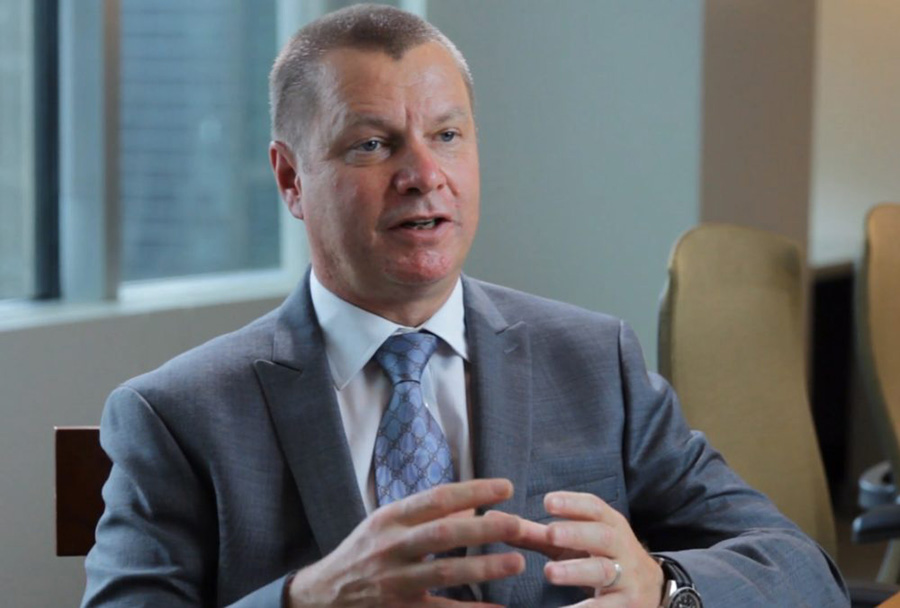Jeff Baxter and VBI Vaccines are on a quest to develop a pan-coronavirus vaccine not just for COVID-19 but also MERS and other SARS. In fact, last week two of VBI’s coronavirus vaccine candidates were selected to move into human clinical trials.
Baxter, VBI Vaccines President and Chief Executive Officer, has been with the company since 2009. Prior to that, he was a managing partner for The Column Group, a venture capital firm, and served as Senior Vice President of Research and Development at GlaxoSmithKline.
Health Evolution Editor-in-Chief Tom Sullivan spoke with Baxter about why he’s encouraged by vaccine developments thus far, the status of VBI’s pan-coronavirus trials, reasons he would advocate for a human challenge to drive faster development timelines, and the need for societal healing.
Health Evolution: When COVID-19 arrived in America, most predictions suggested that vaccine development would require 18-24 months. Now, six months later are you encouraged? Discouraged? What is your outlook for timing?
Baxter: I am much more encouraged. The advances by Pfizer, BioNTech, Moderna, Novavax, I absolutely believe those will be effective and approved for first line responders and people at risk. And I believe those high priority people should be vaccinated by the end of next year. I am very hopeful that at least 4-5 fast moving vaccines will be approved in the second and third quarters of next year. That will be essential to protecting front line workers. Then in mid-2021-2022, I hope we have other vaccines particularly for elderly people. By the end of 2022, a dozen or so vaccines should be available such that people can go to CVS to select a vaccine that is right for that individual.
Health Evolution: Where do the VBI vaccine candidates that were selected for human trials fit into the picture?
Baxter: We certainly believe we have the potential to be a single dose vaccine that is stronger and more effective than some of the others that take two doses. It could be a one–shot vaccine for people 45 and younger, and maybe 3 doses in those 45 and older. The higher level of immunity you start with the better. So our study will last 6 months, taking us through to the middle of next year.
Health Evolution: What are the most substantive differences between VBIs trial vaccines and the others currently in development?
Baxter: While everyone has been blown away by the warp speed of development, many vaccines require doses of 20-30 micrograms and some are at 100 micrograms. Ours at one dose provides higher protective antibodies with 2-5 micrograms, so you can produce 20x more vaccine than one that is 100 micrograms. That matters because the first priority in the U.S. will be the 10 million first line responders, which will require 20 million 100 microgram doses. After first line responders, the priority is the 100 million people at risk for comorbidities, another 200 million doses. Then there are 200 million more Americans that still need to be vaccinated. If you look at humanity, while the situation is severe in the U.S., the human aspect is everywhere. India now has a record number of infections, for instance. So it means a lot for humanity to be able to produce vaccines at scale, at lower costs, and in local areas. Ours is a ubiquitous manufacturing process that can be performed in China, Brazil, elsewhere. We are talking with partners about doing that.
Health Evolution: What comes next? How do you envision this testing proceeding and when might we be close to a vaccine?
Baxter: It depends on how aggressive or ambitious the regulators want to be for phase 3. At the moment, they’re sticking with 30,000 people to prove prevention of disease. That depends on enough circulating COVID-19 infections to prove that the subjects are protected, but there is emerging data from all of these trials that that there is a level of neutralizing antibodies that your body can produce to protect you — that means the trial could go faster.
Health Evolution: How would that work? What would make the trial go faster?
Baxter: We have just completed a 4,000-subject trial for prevention of Hepatitis B and for that one the level of protection is already known and understood – so the FDA requires 4,000 subjects in the database. If we could establish the same parameters for the coronavirus vaccine, we could start a phase 3 trial in the middle of next year. There’s also a more aggressive, human challenge study. You enroll 400-500 volunteers, vaccinate them and then expose them to the virus.










